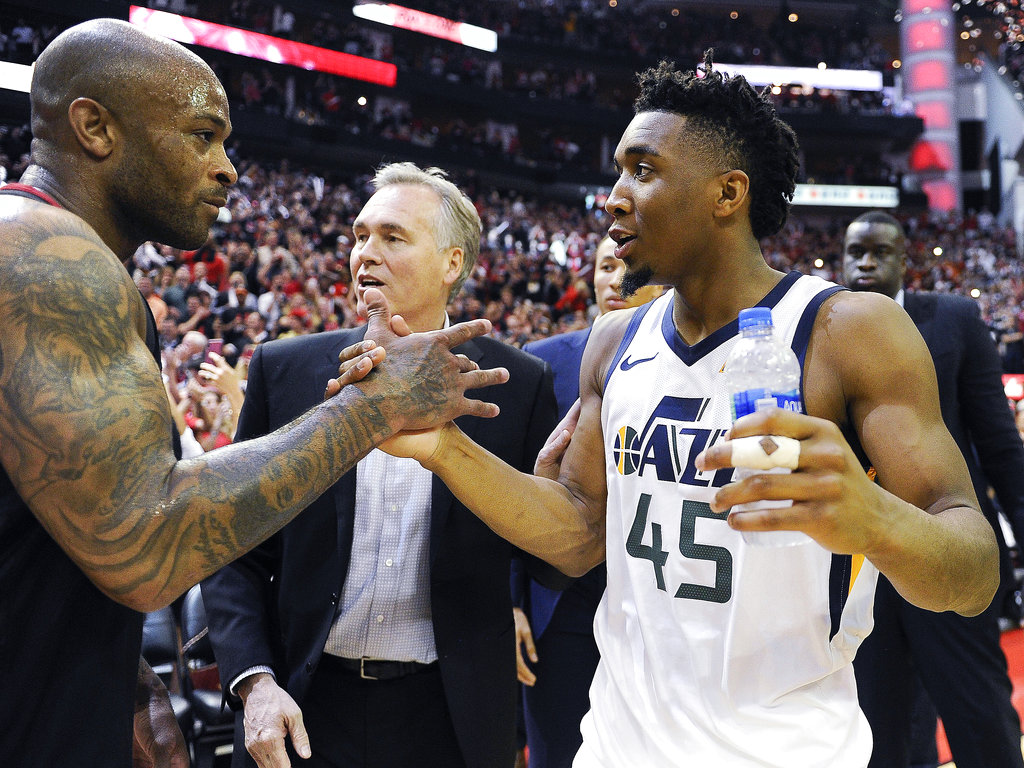Donovan Mitchell remains key as Jazz head into offseason

Utah Jazz’ Donovan Mitchell, right, shakes hands with Houston Rockets’ PJ Tucker after the team’s loss in Game 5 of an NBA basketball second-round playoff series, Tuesday, May 8, 2018, in Houston. (AP Photo/Eric Christian Smith)
SALT LAKE CITY — Restless nights became common for Donovan Mitchell during his rookie season.
Mitchell worried about being able to make the playoffs and he worried about whether he was doing enough of the right things to get the Utah Jazz there.
Article continues after this advertisement“There would be nights where I just couldn’t fall asleep,” Mitchell said. “I’d just be in bed and couldn’t sleep because I was thinking about it. This is crazy how all this has come together to be honest.”
Crazy sums up how the season played out for Mitchell and the Jazz.
Few NBA teams have ever experienced as dramatic an in-season turnaround as Utah. The Jazz fell to 19-28 in mid-January and seemed headed for a lottery pick rather than a playoff spot. Things changed dramatically once Rudy Gobert came back from a knee injury and Mitchell emerged as the team’s top playmaker on offense.
Article continues after this advertisementThe Jazz won 29 of their final 35 regular-season games to claim a playoff spot. They beat Oklahoma City in six games to reach the Western Conference semifinals, where they lost 4-1 to the Houston Rockets.
“There was a good team in there somewhere, we just didn’t know to what degree,” Jazz general manager Dennis Lindsey said Wednesday as the team prepared to head into the offseason. “It took us a while to figure out things.”
Mitchell emerged as a true star during the journey. He set multiple franchise rookie records and finished the season leading Utah in scoring at 20.5 points per game. Mitchell also developed an ability to take over games offensively late in the season, giving the Jazz a boost at critical times.
Like he did during his rookie season, Mitchell aims to set the pace during offseason development. He is pushing himself to become an All-Star, a top defensive player and even an MVP at some point.
“You can ride the wave and be complacent. I’ve never been that way,” Mitchell said.
With Utah returning much of its young core next season, the Jazz are focused on making internal improvements to help those players reach their full potential. Utah has only four players 30 years old or older on the roster and only one, Joe Ingles, is in the starting lineup.
Here are other things to ponder going into the Jazz offseason:
FAVORS FREE AGENCY
At one point, it seemed like a sure thing that Derrick Favors would go elsewhere when he became a free agent after the season. Now such an outcome isn’t so certain. Favors bounced back after a pair of injury-plagued seasons and averaged 12.3 points and 7.2 rebounds and accepted a more complementary role this season. Bringing Favors back will still be tough. The demand could be robust for Favors and Utah may opt to bring in a stretch four rather than pair Favors and Gobert in a spacing-challenged frontcourt again.
EXUM’S HEALTH
Retaining Dante Exum is going to be a priority. Exum enters free agency as a player with tantalizing skills whose development has been slowed by injuries. He missed all but 14 games this season after suffering a preseason shoulder injury. Still, Exum averaged a career-best 8.1 points on 48.3 percent shooting and showed an ability to be a lockdown defender. The Jazz are willing to gamble he can stay healthy and develop into their point guard of the future.
SCORING PUNCH
Boosting offensive production will be an area of emphasis for the Jazz. Utah emerged as a strong defensive team. But the Jazz lacked many consistent options beyond Mitchell when it came to players who could create their own shot. The Jazz will need to shore up an offense that generated 104.1 points per game — ranking 19th out of 30 NBA teams.
NON-GUARANTEED CONTRACTS
Utah could bring a radically different second unit back for next season. Thabo Sefolosha, Jonas Jerebko and Ekpe Udoh all enter the second year of two-year deals. All three are cap-friendly deals but they’re not guaranteed until July, giving the Jazz some flexibility to make some upgrades if the right pieces are available.
CROWDER’S SHOOTING
Jae Crowder joined Utah at the trade deadline and gave the Jazz a much-needed physical wing defender. Crowder struggled with his shot at times while learning the offense on the fly. He shot just 38.6 percent from the field in 27 regular-season games with Utah and it dipped to 32.4 percent in the postseason. Crowder’s shot will need to improve considerably for him to become a consistent sixth man for the Jazz.